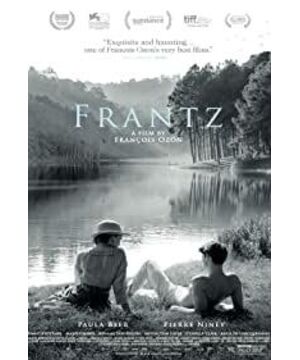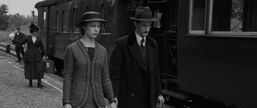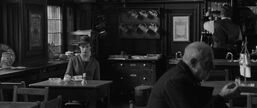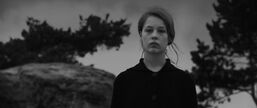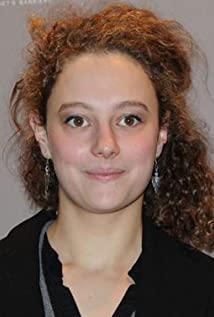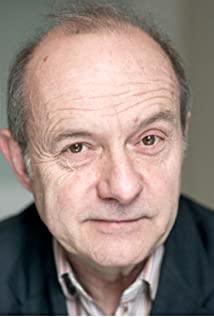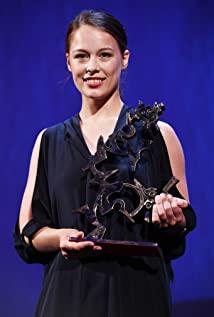I haven't watched any other films of Francois Ou Jong, no comparison, no experience in film reviews, but I think this is a good start.
This movie is like a very long shot, fluent and flowing, from the perspective of a post-war woman. She is beautiful, she is sad, she forbears, she accepts the intruder of life, she walks out of the house into another world. The movie opens with Anna wearing a long black dress, her mouth is drooping in Polish style, as if she is enduring great sadness without telling it. Following the director’s narration, I slowly learned about her life, how she fell in love with her fiancé Franz, she would study in the cemetery, and she liked the French poet Verlaine the most. The appearance of Frenchman Adrian is the floodgate for her seemingly peaceful life. She has been saddened by the loss of her fiance before, but she has to be the support of her fiance’s parents. She strives to support a black and white life, and she lives for others.
She and the doctor's family accepted Adrian who came to pay for their sins, and missed Franz in his white lie. Anna imagined Franz's school life in Paris. The prom, the Louvre, and the concert were all her dreams. When describing Adrian's sensitive and fragile characteristics of an artist, the director Francois Ougon specially processed his lies, making people think that their feelings are more than just friends. Perhaps this aspect is a feature that the director is good at, and on the other hand it responds to the feelings of Anna's favorite poet Verlaine and Rimbaud. The persistent and strong Anna projected herself on Verlaine's poetry, and the director also projected the poet's feelings on her. And for the thin and talented Adrian, just like Rimbaud, for the first time, his lies made Anna's black and white world colorful.
The second time was a walk and talk in the mountains.
The third time is the end of the movie. With the support of the doctors and his wife, Anna went to Paris to search for Adrian. Along the way, she saw French cities in ruins. People cast angry and suspicious eyes because of her being a German, and saw the broken limbs and cemetery of Les Invalides. . The men in the tavern sang the Marseillaise, and the women, like her and the doctor's wife, had solemn expressions and silently assumed the war to take their husbands, fathers, and brothers. After all, the glory belongs to the men and the pain belongs to the women. Anna felt the same for Adrian in Germany, and she understood the difficulty of redemption. Between the ruined walls, everyone's heart was broken. However, the pursuit of love is not part of the story of atonement and forgiveness. This is a new story, and Adrian cannot bear her love. Perhaps Anna herself understands that her resolute search is more like an explanation of her love. In Adrian's house, there are elegant mothers and fiancees with beautiful singing voices. They are the epitome of post-war women. They bravely support the family and the tired and fearful man who has returned from the battlefield.
This time, Anna decided to live for herself. Instead of returning to Germany, she stopped in Paris. She has always yearned to go to Paris to take a look. Before Manet's "Suicide" at the Louvre, her face brightened again, and her lips returned to blood.
After the First World War, the whole of Europe fell into the abyss. The fierceness of the war forced people to erect monuments to the dead, so that people must avoid the second war anyway. Therefore, when facing fascism, the governments of various countries replaced active challenges with neutrality and appeasement. These decision makers are all men. It is the fact that the doctor confided in the tavern. The father pushed his son to the battlefield; the government acting as the protector and father pushed the people to the battlefield.
Many people understand the director's view of this period of history and the future from the perspective of French-German reconciliation, but I always feel that it is a bit misplaced. The director's shots are personal and feminine. The imaginary relationship between Adrian and Franz is ambiguous. Anna's favorite poet is Verlaine, and Manet's "Suicide" has been repeated many times. Personal feelings and concerns are so drifting in the face of national supremacy and patriotism, just like the yellow leaves in Verlaine's "Autumn Song". The change of color also happened to be the node of Anna's personal transformation. The doctors and wife once said that Anna supported them through the grief of losing their children. Anna also discussed with Adrian that people cannot live for themselves. When the doctor and his wife found solace in the story woven by Adrian and Anna, and turned to support Anna to find her love, Anna could then go to Paris with peace of mind. The death with Adrian finally made her realize that Anna, who used to live for others, is dead, so she smiled and said to the sad teenager sitting side by side: "This painting gave me the courage to live."
The sound of autumn screamed, like a violin crying, the gloomy long and unbearable, stung my heart and spleen. It was dull and boring, the bells swayed from the past like smoke, reappearing before my eyes, my tears fell like rain.
——Verlaine "Autumn Song"
View more about Frantz reviews


